Together on the Journey: A Weekly Word from Archbishop Hebda

Yesterday, the Church celebrated Divine Mercy Sunday. This feast day was instituted by St. John Paul II, drawing on the writings and visions of the Polish mystic, St. Faustina Kowalska. This feast held deep personal significance for St. John Paul II, who often preached about God’s great mercy. He was an avid student of St. Faustina’s writings and had been instrumental when in Krakow in helping the Holy See to understand Faustina’s writings in their proper context. It was considered providential that he passed on to eternal life on the vigil of Divine Mercy Sunday twenty years ago, after having beatified and canonized St. Faustina. The feast today has universal significance for our Church, bringing to a conclusion the Octave of Easter.
Even with the benefit of St. Faustina’s famous diary, it’s not surprising that those who contemplate God’s mercy quickly realize that it’s beyond anything imaginable by any human standards. God’s ways are clearly not our ways when it comes to forgiveness and mercy—and that is critical for our salvation. All of us are sinners in need of God’s mercy.
It’s appropriate that yesterday’s celebration was preceded by 40 days of Lent, which always helps me to have a deeper awareness of my sin and the need for repentance. It’s a fitting prelude for a celebration of Easter mercy. As Father John Riccardo says: Without the bad news, the Good News would be just news.
The Easter Gospels all call us to go out and be witnesses, to share the Good News, and yesterday’s feast of Divine Mercy reminds us of why Jesus has called his followers to this important task. Just as we all have to face the risk of being separated from God when we, like Adam and Eve, put our will before God’s, we are all called to celebrate God’s mercy. Jesus’ request from the cross, “Father, forgive them,” is intended for all of us.
Our merciful Savior is the reason for our confidence. As St. Paul writes to the Romans, “For I am convinced that neither death, nor life, nor angels, nor rulers, nor things present, nor things to come, nor powers, nor height, nor depth, nor anything else in all creation, will be able to separate us from the love of God in Christ Jesus our Lord” (Romans 8:38-39).
We have the opportunity to experience Jesus’ mercy today through the sacraments, which are illustrated beautifully in the Divine Mercy image. Painted according to St. Faustina’s revelations, Jesus is seen touching a finger to his heart, from which rays of blue and red are streaming. These rays recall the water and blood – representing the sacraments of baptism and Eucharist – which flowed from the pierced heart of Jesus on the cross.
As we continue this joyful Easter season, let’s be sure to celebrate what St. Faustina called the “unfathomable mercy” of our Lord, the reason for our hope (1 Peter 3:15).



